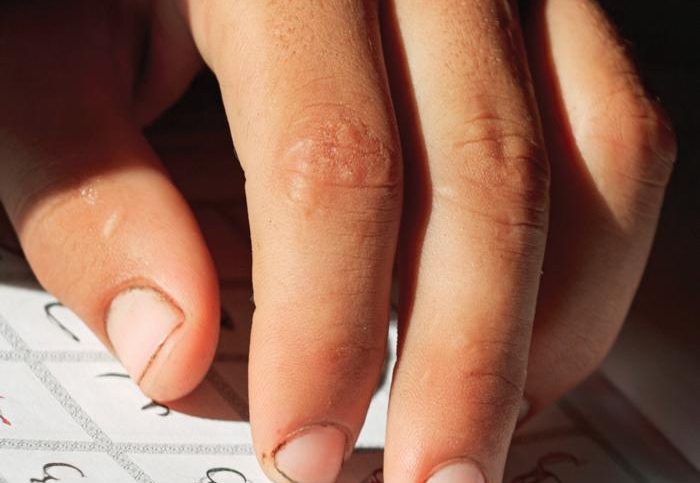Her uncle owns the school, which is both good and bad. It is good because she pays for nothing, bad because everybody knows she pays for nothing. That, and there’s the Arabic classes she has to take, they all do. It’s a rule, but that doesn’t mean she has to like it. Listen to this.
“Yes, I hate Arabic class.”
There you have it. But never mind because at 16 going on 17 she can say things like that and think it perfectly all right because it’s how she feels, and feelings at that age are, I remember, everything. Later, when she is older, long since graduated from her uncle’s school, if you remind her what she once said about Arabic class, she’ll deny it. Listen to this.
“No, you’re wrong. Absolutely wrong. I would never say something like that, even at 16. I might think it, but say it? Never.”
Her father and mother will never learn how much she dislikes Arabic class. When she comes home crying and angry, or both, and her mom asks, “Reedah, what in the world is wrong?” she’ll say things like ‘Nothing’ or ‘you wouldn’t understand’, or, once, ‘What time is dinner?’ The mother almost never follows Reedah into her room when she storms off. But Reedah’s older sister will because she knows Reedah is like that–always has been–and when she asks, “What’s wrong?” Reedah, with new tears, sitting on the bed, hands knotted in her lap, will tell her, and once she is all done, the older sister—who works at an insurance company on Soor Street and no longer has to worry about things like Arabic classes–will say what Reedah does not want to hear, “Is that all?’ This will lead to Reedah knotting her hands even tighter, whiter, which will lead to her saying something else, something louder, and the older sister will shrug and leave her bedroom, softly clicking the door shut behind her. It is this part, gently clicking shut the door, that makes Reedah’s extra furious. So, there you have it, Reedah at 16 going on 17, with her Arabic class, every Sunday, Tuesday and Thursday, 10:00-10:50, with Mr. Waleed, room B102, in her uncle’s school. And there’s nothing she can do about it.
Of course Reedah went on to pass her Arabic class, and although it was not the A that she hoped for, she was happy that, for the time being, it was over.
If you ask her now what it was about Arabic class she found so hateful, she will say how she was picked on by the teacher, Mr. Waleed. Listen to this: “I was picked on by the teacher, Mr. Waleed.” Even now, saying his name is like biting into a lemon, the way she wrinkles her cheeks, giving her head a good shake. “I am sure of it. Why? Because my uncle owned the school, of course.” But Reedah is not done, there’s more and she’s telling you what she has never even told her older sister, not to mention the uncle, her father’s brother. “Mr. Waleed called on me every single class, Sah? Every class. Even when there was no need to call on me he called on me. He wanted to embarrass me. I am sure of it. ‘Reedah, stand up and tell us all the answer to question four. Nam, four. You do have an answer, Reedah? Yes, of course you do and what might that be?’ We all knew what he was doing, and even when my answer was right it was wrong. Everybody looking at me, followed by a well-placed snicker from those two Hawally girls who sat in the back row. I could feel their eyes on the back of my head,” Her fingertips touching the curve of her neck. “So yes,” sighing, . . . “Nam, it is over but I still feel bad about it, about the way he called on me every day, having me sit in the front row, having me stand up to give a right answer that was, according to him, always wrong.” Suddenly holding up the soft white of her palm, “I know what you’re thinking: talk to my uncle. Have him say something to Mr. Waleed. But of course that was impossible, Sah. I know my uncle, a big man with a big moustache, who simply would have smiled, maybe even smirked, leaning over to tap me on the wrist, whispering, “’Now, now, Reedah, let the man be.’” Setting her palm flat on the tabletop, “Still, …” taking a deep breath, as if she had been underwater for a long time and only now, out of air, has no choice but to surface, “…still, it is over. But it was not a good finish. There was nothing good about it.”
Now 22 going on 23, Reedah leans across the table, taps me on the wrist, licks her lips and says, “You know I saw him in the supermarket just the other day. Mr. Waleed. Same man, but smaller, less hair, something all wrong with his foot that wasn’t there before, but it was him all right, and you know what, he walked right past me. He saw me coming, I know he did, looking straight into my face, but there was nothing, not a sign, not a wink, not a ‘Hi how are you’, nothing, he just kept on walking.” Her eyes glistening, licking her lips again to get the words just right, continuing, “It was almost as if he didn’t remember me, didn’t know who I was. After all that, after all we’ve been through, as if he didn’t remember a thing about me.”










